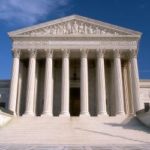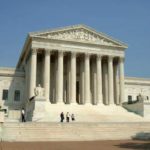In a constitutional system of government, the role of the judiciary is essential for maintaining the balance of power, protecting individual rights, upholding the rule of law, interpreting the Constitution, and ensuring equal justice for all. In this lesson, students learn about the role of an independent judiciary in the United States.
Grade 9-12 The Judiciary Act of 1789
The purpose of this lesson is to teach students about the significance of the Judiciary Act of 1789 in establishing a federal judiciary, and the power of judicial review as outlined by the landmark U.S. Supreme Court Case, Marbury v. Madison (1803). By the conclusion of this lesson, students will understand the key provisions of the Judiciary Act of 1789 and the structure of the federal judiciary, as well as the power of judicial review.
Grade 6-8 The Judiciary Act of 1789
The purpose of this lesson is to teach students about the significance of the Judiciary Act of 1789 in establishing a federal judiciary. By the conclusion of this lesson, students will understand the key provisions of the Judiciary Act of 1789 and the structure of the federal judicial branch.
Court Shorts: An Impartial Federal Judiciary
This short video from the U.S. Courts focuses on the importance of a fair and impartial judiciary. What does this concept mean to you? In this video, students question federal judges on these principles.
An Independent Judiciary: Cherokee Nation v. Georgia and Cooper v. Aaron

This documentary explores the Supreme Court cases Cherokee Nation v. Georgia (1831) and Cooper v. Aaron (1958) that defined our understanding of the role of the judiciary. In Cherokee Nation, the Supreme Court ruled it lacked the jurisdiction to review the claims of an Indian nation in the U.S. In Cooper v. Aaron, the Court affirmed that its interpretation of the Constitution was the “supreme law of the land” and that states were bound by its decisions. A PDF lesson guide is provided.
How Federal Courts Impact You Every Day
2018 is the 229th anniversary of the creation of the federal courts. What difference do they make in the daily lives of law-abiding teens? From that first check of the mobile device in the morning to the last newscast at night, decisions made in federal courts touch every aspect of daily life. Who are the judges making the decisions? How are they selected? What is their job description? What is an impartial judiciary? How was the federal court system created?
The Supreme Court: The Judicial Power of the United States

This lesson provides an introduction to the Supreme Court. Students will learn basic facts about the Supreme Court by examining the United States Constitution and one of the landmark cases decided by that court. The lesson is designed to help students understand how the Supreme Court operates.
The federal judiciary, which includes the Supreme Court as well as the district and circuit courts, is one of three branches of the federal government. The judiciary has played a key role in American history and remains a powerful voice in resolving contemporary controversies. The first governing document of this nation, the Articles of Confederation, gave Congress certain judicial powers, but did not establish a distinct federal court system.
Court Packing vs. Reorganizing: The Supreme Court in the New Deal
This activity presents students with a 1937 letter written by newspaper publisher Frank Gannett opposing President Franklin Delano Roosevelt’s plan to “reorganize the judiciary” (also known as his “court-packing” plan). Students will read and analyze this letter to understand Gannett’s perspective on this controversial issue.
Pathways to the Bench
U.S. District Court Judge Donovan Frank, of Minnesota, is featured in the latest installment of the Pathways to the Bench video series produced by the Administrative Office of the U.S. Courts to inspire and inform the public about the human face of the federal judiciary. In the series, individual judges talk about the personal, character-building challenges that have prepared them to serve on the bench. In this brief video, Judge Frank says that adversity has made him a better person and a better jurist.
2017 Supreme Court Nomination: Advising Senators Activity
Are you teaching about President Trump’s nomination of Judge Neil Gorsuch to the U.S. Supreme Court? Lead your students through an exploration of the process and have them take on a role as adviser to a senator in preparation for the Senate Judiciary Committee’s confirmation hearing.